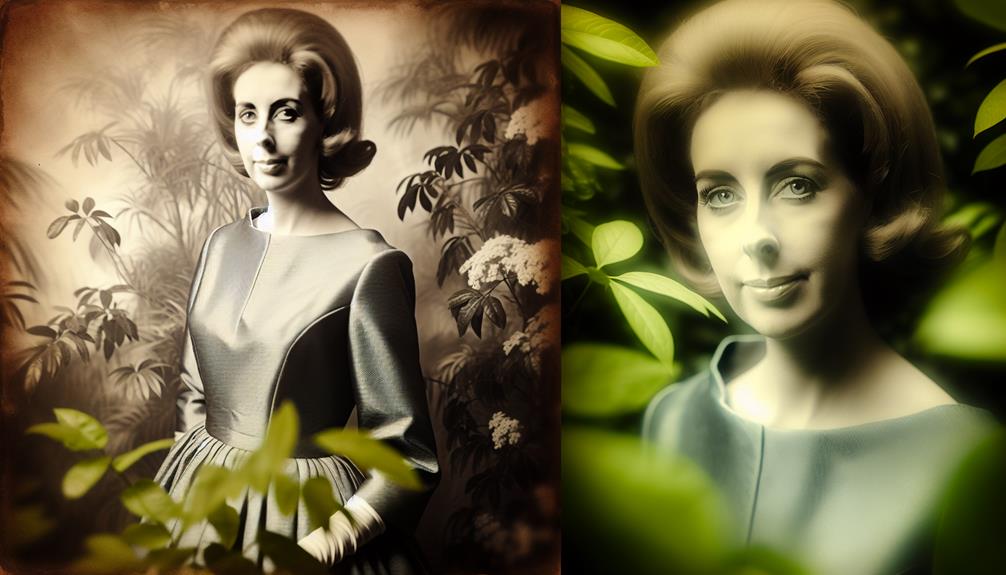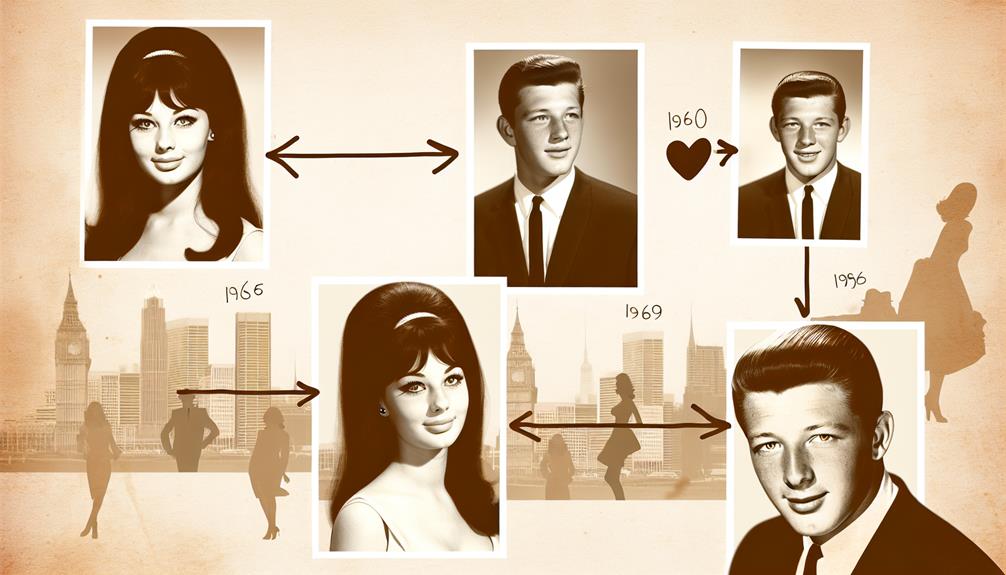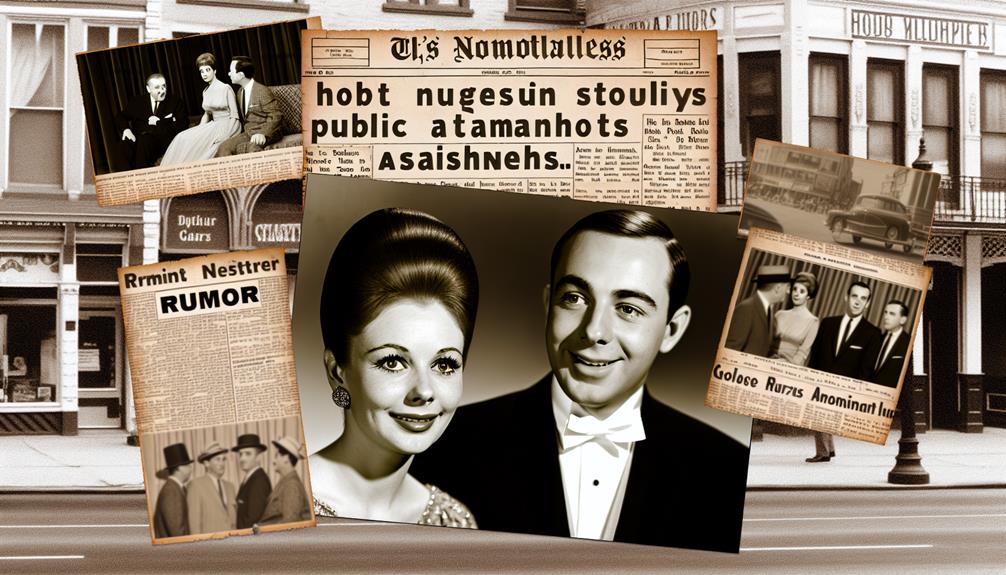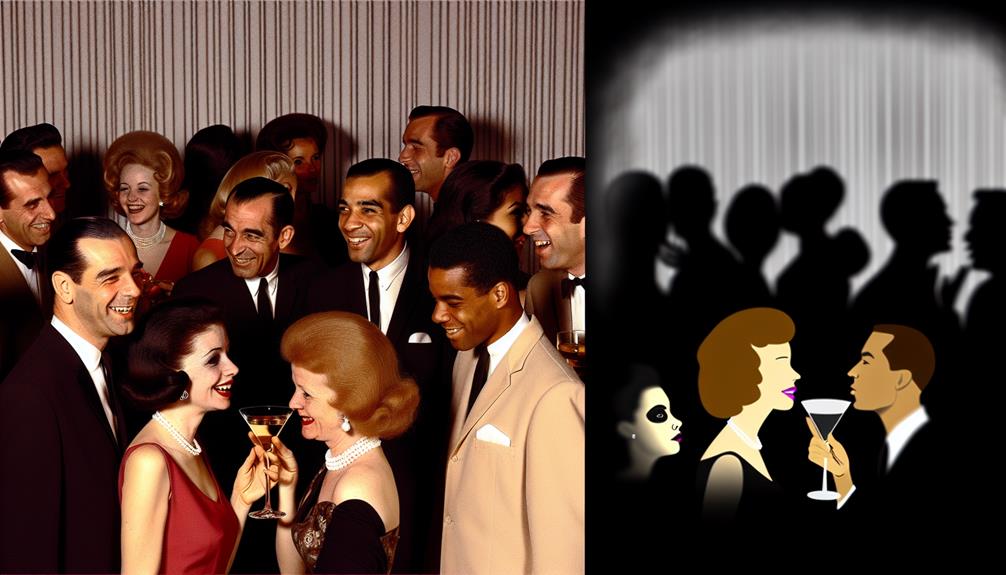The alleged affair between Diana De Vegh and John F. Kennedy unfolded in the early 1960s, marked by initial encounters at elite social gatherings. Their relationship developed amidst JFK's well-documented infidelities, which raised questions about his integrity and leadership. The affair remained cloaked in secrecy, fueled by media speculation and varied witness accounts. Reports suggest emotional exchanges and coded communications, reflecting a complex dynamic of attraction and external pressure. The discourse surrounding this affair highlights the tension between personal conduct and public expectation. Further exploration reveals a deeper understanding of their relationship amid the political landscape of the time.
Key Takeaways
- Diana De Vegh and JFK allegedly began their affair in the early 1960s, marked by initial encounters at elite social gatherings.
- Their relationship evolved with increased communication and personal rapport, particularly noted in mid-1962.
- Media coverage fueled public speculation about the affair, often sensationalizing its details and dynamics.
- Witness accounts vary widely, with some claiming intimacy while others suggest a platonic connection, complicating historical consensus.
- The alleged affair raises questions about power dynamics and the impact of personal indiscretions on political credibility during JFK's presidency.
Background of Diana De Vegh

Although details about her early life remain somewhat elusive, Diana De Vegh emerged as a prominent figure in the early 1960s, gaining recognition not only for her professional achievements but also for her involvement in high-profile social circles. During this time, many individuals, including celebrities, faced personal challenges that often played out in the public eye, similar to the ongoing concerns surrounding Bruce Willis's health journey. Diana's upbringing, characterized by a blend of academic rigor and artistic influence, laid the foundation for her multifaceted career. Growing up in an environment that valued education and creativity, she developed a strong sense of purpose and ambition.
Her personal achievements include notable contributions to the fields of art and literature, as well as her engagement with various philanthropic efforts. This combination of talents positioned her as an influential individual in both artistic and social domains. As she navigated the complexities of mid-century American society, De Vegh became synonymous with elegance and intellect, attracting attention from notable figures of her time.
Her allure was not solely due to her accomplishments; it was also her ability to connect with others that solidified her status. Through her social interactions and professional endeavors, Diana De Vegh crafted a legacy that resonates with those seeking inspiration in the interplay of personal and professional life.
JFK's Romantic History
JFK's romantic history is marked by a series of high-profile relationships that not only captivated the public but also influenced the political landscape of his era. His infidelity became a focal point of numerous romantic scandals, overshadowing his presidency and raising questions about the integrity of political leaders.
The allure of JFK's charisma drew many influential women into his orbit, including Hollywood stars and socialites. While his marriage to Jacqueline Kennedy was emblematic of political royalty, JFK's extramarital escapades often contradicted the idealized image of family and fidelity he projected. These relationships not only posed personal dilemmas but also had potential implications for national security and diplomacy during the Cold War.
The table below provides a brief overview of notable relationships and scandals associated with JFK:
| Relationship | Impact on JFK |
|---|---|
| Marilyn Monroe | Heightened celebrity status |
| Judith Campbell Exner | Questions about national security |
| Ellen Rometsch | Allegations of espionage connections |
| Inga Arvad | Strained U.S.-Denmark relations |
Thus, JFK's romantic history remains a complex tapestry of love, betrayal, and political intrigue.
Timeline of Alleged Affair

The timeline of the alleged affair between Diana De Vegh and John F. Kennedy provides a structured overview of their initial encounter, key relationship milestones, and the subsequent media coverage that surrounded them. Recent events in pop culture often highlight similar themes of scandal and intrigue, as seen in the world of celebrity news, including updates on figures like P. Diddy, who has faced his own share of controversies latest updates on his career. Understanding these chronological events is vital in evaluating the authenticity and impact of their purported connection. By examining the specific details and context of their interactions, one can gain insight into the dynamics of this controversial relationship.
Initial Encounter Details
In the early 1960s, a series of encounters laid the groundwork for the alleged affair between Diana De Vegh and President John F. Kennedy. Their initial attraction began with unexpected meetings that sparked curiosity and intrigue. These pivotal moments not only set the stage for their relationship but also highlighted the complex dynamics of power and desire.
| Date | Event Description |
|---|---|
| Summer 1961 | Diana De Vegh first meets JFK at a social gathering. |
| Fall 1961 | An unexpected meeting at a charity event occurs. |
| Early 1962 | Subsequent encounters at political functions deepen their connection. |
| Mid 1962 | Reports suggest increased communication between the two. |
The initial meetings were characterized by a magnetic energy, where both parties were drawn to one another amidst the social and political milieu of the time. These encounters not only reflect the personal chemistry between De Vegh and JFK but also underscore the societal context in which they unfolded. As their interactions evolved, so too did the implications they held, weaving a narrative that continues to capture public interest.
Key Relationship Milestones
Key moments in the alleged affair between Diana De Vegh and President John F. Kennedy reveal a complex interplay of emotional dynamics and secrecy strategies. Initial interactions reportedly unfolded during the early 1960s, at social gatherings where both figures moved within elite circles. Their relationship deepened as they navigated the challenges of maintaining discretion amidst intense public scrutiny.
By mid-1962, De Vegh and Kennedy were believed to have established a more personal rapport, often communicating through coded messages and clandestine meetings. This strategic approach reflected the necessity for secrecy, as both individuals understood the potential repercussions of their liaison. The emotional dynamics of their relationship appeared to oscillate between genuine affection and the pressures of external expectations, which may have intensified their bond.
As the political landscape shifted, the affair reportedly faced challenges, yet both parties remained committed to their secrecy strategies, enabling them to continue their connection. The culmination of these key milestones highlights not only the intricate nature of their relationship but also the broader implications of personal affairs in the context of public life, raising questions about authenticity and the cost of such entanglements.
Media Coverage Timeline
Amidst the backdrop of their clandestine relationship, media coverage surrounding the alleged affair between Diana De Vegh and President John F. Kennedy has evolved considerably over the decades. The initial reports emerged in the early 1960s, coinciding with heightened public interest in the personal lives of political figures. This era was marked by a burgeoning tabloid culture, which thrived on media speculation regarding the private affairs of prominent individuals, including the young and charismatic president.
As rumors circulated, various outlets began to connect De Vegh's name with JFK, often sensationalizing their relationship to capture audience attention. However, substantial evidence to confirm the affair remained elusive, leading to a cycle of speculation rather than concrete reporting. The narrative continued to unfold in subsequent years, with retrospective analysis and renewed interest in the Kennedy administration's complexities.
In contemporary discourse, the affair is often revisited, reflecting broader societal themes regarding power dynamics, gender, and the public's insatiable curiosity about the lives of those in authority. Through this lens, the media's role in shaping the perception of De Vegh and JFK's relationship remains a critical aspect of understanding their legacy.
Key Evidence and Testimonies
The examination of key evidence and testimonies surrounding the alleged affair between Diana De Vegh and JFK reveals a complex interplay of witness accounts and correspondence analysis. Understanding the dynamics of past relationships can provide insights into discovering local business opportunities, which parallels the investigation of personal connections in historical narratives. An overview of eyewitness testimonies provides a foundation for understanding the nature and context of their interactions, while an in-depth analysis of related correspondence may yield insights into their relationship dynamics. Together, these elements form a critical basis for evaluating the veracity of the claims surrounding this historical narrative.
Witness Accounts Overview
Numerous witness accounts have emerged over the years, each contributing to the complex narrative surrounding the alleged affair between Diana De Vegh and President John F. Kennedy. These accounts vary considerably, highlighting the challenges of establishing a clear historical consensus. Witness credibility plays a pivotal role in this discourse, with some individuals possessing strong ties to the political and social circles of the time, while others remain less verifiable.
Key testimonies have been presented by those claiming to have witnessed interactions between De Vegh and Kennedy, yet many of these accounts are marred by conflicting testimonies. For instance, several witnesses assert that they observed intimate exchanges, while others refute such claims, emphasizing a more platonic relationship. This divergence complicates the investigation into the nature of their connection, leaving room for skepticism and debate.
As the narrative continues to unfold, the interplay of credibility and conflicting testimonies will certainly shape public perception and historical interpretation. Ultimately, the quest for truth surrounding the alleged affair necessitates a careful analysis of all available evidence, inviting both researchers and enthusiasts to engage in this enduring mystery.
Correspondence Analysis Findings
Correspondence analysis has emerged as an essential component in examining the alleged affair between Diana De Vegh and President John F. Kennedy. This method involves scrutinizing the correspondence patterns between the two individuals, seeking to reveal the underlying dynamics of their interactions. Through a meticulous review of letters, notes, and documented communications, researchers have identified significant emotional tones that point to a complex relationship.
Key findings indicate that the correspondence exhibits a blend of intimacy and formality, suggesting a nuanced rapport that transcends mere acquaintance. The emotional tone of the communications often oscillates between warmth and caution, which may reflect the precarious nature of their connection, considering the societal and political implications of their respective positions.
Additionally, testimonies from those who observed their interactions lend credence to the correspondence analysis, reinforcing the idea of a profound bond that may have existed. By focusing on these detailed patterns, it becomes evident that the relationship between De Vegh and JFK warrants further exploration, as it sheds light on the personal struggles and societal expectations of the era. Ultimately, these insights contribute to a deeper understanding of their alleged affair.
Public Reaction and Media Coverage

Public reaction to the affair between Diana De Vegh and President John F. Kennedy was marked by a complex interplay of intrigue and skepticism. The media frenzy surrounding the alleged relationship fueled public sentiment, with opinions varying widely among different demographics. The affair, while sensational, also raised questions about the nature of personal relationships in the political sphere. In an era where public figures were increasingly scrutinized, the affair paralleled discussions on professional integrity, much like the ongoing evolution in the job market for roles such as data analysts, where launching a career in data analysis has become essential.
- Sensationalism in Reporting: Many outlets emphasized scandalous details, often overshadowing the personal narratives involved.
- Public Divisions: The affair polarized public opinion, with some viewing it as a genuine romantic connection and others dismissing it as a fleeting dalliance.
- Cultural Context: The 1960s were marked by shifting social norms, which influenced how the public perceived infidelity among political figures.
This media coverage not only amplified the story but also reflected the era's evolving attitudes toward celebrity and power. The fascination with the affair allowed for broader discussions about trust and integrity in leadership, compelling audiences to grapple with the implications of such relationships on the public stage. Ultimately, the affair became a lens through which society examined its own values and expectations of those in power.
Political Implications
The affair between Diana De Vegh and President John F. Kennedy, whether substantiated or not, presents significant political implications that reverberate through the landscape of American history. At its core, this alleged relationship embodies the intricate power dynamics that characterize the interactions between influential political figures and those within their sphere. Such a political scandal, if proven true, could have undermined JFK's credibility and authority, particularly during a period marked by Cold War tensions and domestic challenges. In this situation, understanding how public figures manage their online engagement is vital, as seen in the use of essential hashtags to boost visibility and connection, which can be reflective of a leader's approach to personal and public narratives essential hashtags.
Additionally, the potential fallout from such an affair could have shifted public perception, altering the electorate's trust in leadership. In a time when the presidency was expected to embody moral rectitude, any revelation of personal indiscretions could have led to intensified scrutiny on the administration and its policies. The implications extend beyond Kennedy himself, influencing the broader discourse around power, gender, and vulnerability in political spaces.
As society continues to grapple with the intersection of personal conduct and public duty, the De Vegh affair serves as a case study in understanding how personal relationships can influence political narratives and the enduring effects of power dynamics in leadership.
Comparison to Other Alleged Affairs

Examining the alleged affair between Diana De Vegh and John F. Kennedy invites intriguing comparisons to other high-profile relationships that have stirred political scandals. Such affairs often reveal the intersection of personal lives and public personas, highlighting how celebrity comparisons can shape public perception and political narratives.
- The affair between Bill Clinton and Monica Lewinsky not only dominated headlines but also led to a significant impeachment trial, emphasizing the potential consequences of personal indiscretions in political life.
- The relationship between Franklin D. Roosevelt and Lucy Mercer showcased a different era, where societal norms around infidelity were deeply intertwined with political power dynamics.
- Similarly, the rumored romance between Gary Hart and Donna Rice illustrates how a politician's personal choices can lead to abrupt career shifts, reinforcing the idea that public figures are held to a different moral standard.
These examples underscore that the alleged affair between De Vegh and JFK is not an isolated incident but part of a broader pattern where political scandals intertwine with celebrity culture. Understanding these comparisons helps contextualize the implications of such relationships within the political arena, shedding light on the impact they have on both individuals and institutions.
Legacy of Their Relationship
Diana De Vegh's relationship with John F. Kennedy has left a complex legacy that continues to evoke varied perceptions. While their alleged affair has often been overshadowed by more publicized relationships in Kennedy's life, it nonetheless holds significant relationship impact on how we perceive both individuals. For De Vegh, the association with a charismatic yet enigmatic figure like JFK has contributed to her historical narrative, intertwining her personal story with the turbulent political landscape of the 1960s.
On the other hand, Kennedy's involvement with De Vegh has implications beyond the personal; it reflects the broader societal attitudes toward power dynamics and private lives of public figures. The legacy perception of their relationship highlights the juxtaposition between romantic entanglements and the responsibilities of leadership, prompting discussions about the moral implications of such affairs.
Ultimately, the legacy of Diana De Vegh and John F. Kennedy's relationship invites us to reconsider the ways in which personal connections shape public personas, encouraging a more nuanced perception of both their lives within the context of American history. This complex interplay continues to resonate, providing insights into the enduring impact of intimate relationships on public figures.
Frequently Asked Questions
What Was Diana De Vegh's Profession Before Her Alleged Affair With JFK?
Before her alleged affair with JFK, Diana De Vegh was a notable figure in the world of art and literature. Her early career included roles as a writer and editor, contributing to various publications. With a personal background steeped in intellectual pursuits, she cultivated a reputation for her insights into cultural and social issues. This foundation in the arts established her as a prominent voice, reflecting her multifaceted talents and interests.
Did Diana De Vegh Ever Publicly Confirm the Affair With JFK?
The question of whether Diana De Vegh ever publicly confirmed her alleged affair with John F. Kennedy remains contentious. Throughout her life, De Vegh made no definitive public statements acknowledging the relationship, which has led to extensive media speculation. This ambiguity contributes to the ongoing intrigue surrounding her connection to the former president. In the absence of concrete evidence or admissions, the narrative largely relies on interpretations drawn from various sources and anecdotes.
How Did Diana's Family React to the Alleged Affair?
The alleged affair prompted complex family dynamics, influencing relationships and perceptions within Diana De Vegh's family. Various members expressed mixed feelings, grappling with public opinion that fluctuated between intrigue and disdain. This situation potentially strained familial bonds as they navigated the implications of the affair's notoriety. Ultimately, the family's reaction encapsulated a broader societal discourse on morality, loyalty, and the personal impact of public scrutiny, revealing the challenges of reconciling private lives with public perceptions.
Were There Any Books Written About Diana De Vegh and Jfk's Relationship?
Numerous books explore the relationship between notable historical figures, often engaging in literary analysis to contextualize their interactions within broader societal frameworks. Regarding Diana De Vegh and John F. Kennedy, several texts examine their alleged relationship, situating it within the historical context of the early 1960s. These works provide insights into their personal dynamics, the implications of such connections, and how they reflect societal norms and expectations of the time, fostering a sense of belonging through shared narratives.
What Impact Did the Affair Have on Diana De Vegh's Life?
The alleged affair had significant personal consequences for Diana De Vegh, impacting her emotional well-being and social standing. Public perception shifted dramatically, as she moved from a private individual to a subject of intense scrutiny. This notoriety likely affected her relationships, career opportunities, and overall quality of life. The dichotomy of her private experiences versus public image illustrates the profound effects that high-profile associations can have on an individual's personal identity and societal role.

